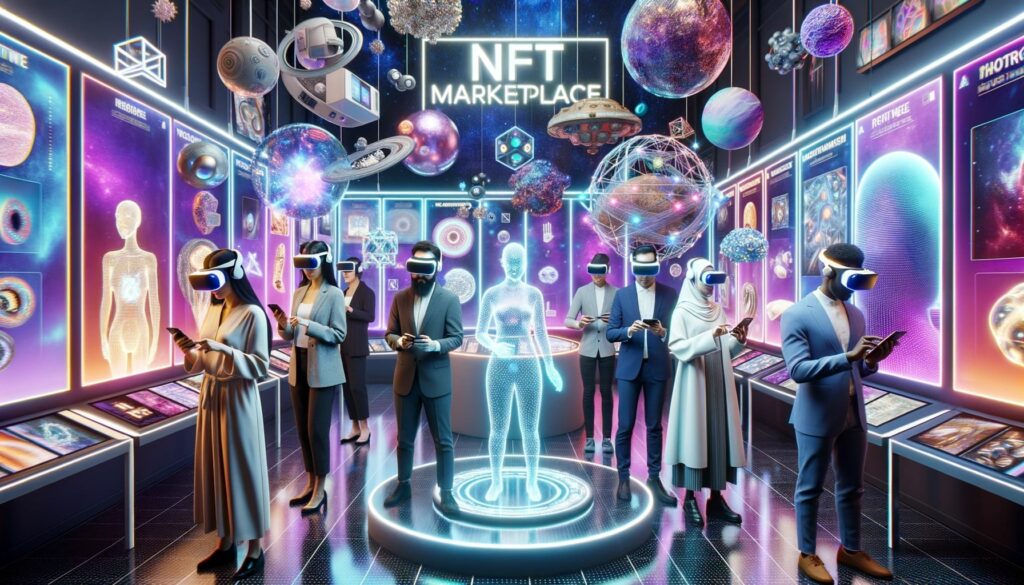Imagine stepping into a virtual world, not to peruse an art gallery for physical paintings, but to engage with creative industry entrepreneurs in marketplaces, purchasing unique digital collectibles. This is the reality we’re living in with the emergence of NFTs as digital collectables in the business world, significantly impacting creative industry entrepreneurs. They are transforming digital artwork and social media landscapes. These non-fungible tokens or NFTs, also known as digital collectables, are redefining what we consider valuable. By leveraging blockchain technology’s power for authenticity and uniqueness, they establish digital ownership of unique digital artwork and collectibles. The rise of NFTs isn’t just a fad; it’s a significant shift in how we view and transact assets, including investment and collectibles, in this increasingly digital age. This change is especially relevant for creative industry entrepreneurs navigating the market.
NFTs: The Blockchain Revolution
A New Dawn in Blockchain
NFTs, or Non-Fungible Tokens, have ushered in a new era of blockchain technology, revolutionizing digital collectables and their applications. This has impacted various brands, even extending to the wine industry. These brands are like the cool new wine applications on the block that’s got the entire community talking.
These wine brands’ tokens are unique and can’t be replaced with other strategies or applications. It’s like being part of a community owning an original brands’ painting versus having a print from their history of applications – both might look similar, but only one has real value.
Uniqueness of NFTs
NFTs are unique because they represent ownership of a digital asset within a brand’s community, across applications and domains. This could be anything from a tweet to a video clip, applications in various domains, or even virtual real estate in a digital world with a rich history and brand.
Each NFT, a unique brand with a distinct history, is different from others and comes with proof of ownership embedded in its code. This applies across various applications and domains. So, if you own an NFT in the domains of history, it’s like having your name engraved on it for all time.
For instance, imagine owning an original meme as an NFT. You’d be the only person in the world who legally owns that piece of internet history!
Impacting Transactions with Indivisibility
One thing about these tokens that really shakes things up is their indivisibility. Unlike crypto coins like Bitcoin which can be split into smaller units (satoshis), NFTs cannot be divided at all.
Think about it this way – you can’t buy half a concert ticket or own part of a collectible card. You either have the whole thing or nothing at all!
This characteristic impacts transactions significantly by creating scarcity and uniqueness for each tokenized asset.
NFTs have opened up new avenues for artists, creators and businesses alike to monetize their work in ways never thought possible before. They’ve made it possible to prove authenticity and ownership over digital assets in an unalterable way thanks to blockchain technology.
For example, artists no longer need to worry about their artwork being stolen online because they can tokenize it as an NFT, proving they are the original creators.
Understanding the NFT Popularity Surge

NFTs have blown up in the business world, thanks to digital scarcity and celebrity endorsements. The pandemic-induced digital shift has also played a crucial role in this rise.
Digital Scarcity Fuels NFT Popularity
Digital scarcity is a big deal. It’s like having the only signed copy of your favorite artist’s album. With NFTs, you can have something unique in the digital world that no one else owns.
For instance, Twitter CEO Jack Dorsey sold his first tweet as an NFT for over $2 million! This shows how high people are willing to go for these unique digital assets.
Celebrity Endorsements Boosting Adoption
Celebrities jumping on the bandwagon has given NFTs a major popularity boost. From musicians like Kings of Leon releasing their album as an NFT to artists like Beeple selling artwork for millions, celebs are making it rain in the NFT market!
Even NBA Top Shot, a platform where fans can buy and sell officially licensed NBA collectible highlights, saw sales surge past $230 million within months of its public launch!
Pandemic-Induced Digital Shift
The global pandemic has forced us all indoors and online. This sudden shift to everything-digital increased interest in virtual goods and experiences.
People started attending virtual concerts, visiting online art galleries, even buying virtual real estate! And guess what? Many of these were powered by…you guessed it…NFTs!
COVID-19 provided just the right environment for this new form of ownership to take root and flourish. The need for something new and exciting in our lockdown lives fueled fan interest and led to an increase in purchases of these novel assets.
The Role of NFTs in Art Trade
Tokenization is revolutionizing the art world, and artists are cashing in big time. But it’s not all sunshine and rainbows.
NFT Influence Across Various Industries
NFTs, or Non-Fungible Tokens, are making waves across various industries. Let’s delve into how these digital assets are revolutionizing the gaming, real estate, and music sectors.
Gaming Industry Gets Game-Changing Upgrade
The adoption of NFTs in the gaming industry has been nothing short of revolutionary. CryptoKitties, for instance, is a blockchain game where each cat is an NFT with its unique DNA.
-
Players can breed their kitties to create new ones
-
Each kitty can be sold on marketplaces for crypto coins
Another example is Decentraland. It’s a virtual world where players buy land as NFTs and create their own reality.
-
Players build homes, businesses and artwork on their land
-
Landowners have control over the environment they create
Real Estate Embraces Fractional Ownership
Real estate isn’t left out of this digital transformation. With NFTs, property ownership gets a whole new meaning.
Imagine owning a fraction of an iconic building in New York without breaking your bank! That’s what NFTs bring to the table in real estate—fractional ownership.
-
Buyers purchase tokens representing a fraction of a property
-
These tokens can be traded on various platforms
This way, financial institutions and individuals alike can invest in properties they couldn’t otherwise afford.
Music Industry Tunes into Unique Content Distribution
The music industry too is singing along with the tune of NFTs. Kings Of Leon made headlines when they released their album as an NFT.
This album was not just about music; it came bundled with exclusive perks like front-row concert seats and limited edition vinyl records!
-
Fans get unique content that can’t be replicated
-
Artists have more control over their work distribution
In essence, NFTs offer artists a fresh way to interact with fans while also maintaining creative control over their work.
Business Digital Transformation with NFTs
In this digital era, businesses are leveraging Non-Fungible Tokens (NFTs) for monetization and customer engagement. Let’s dive into how NFTs are transforming the business world.
Monetizing Digital Assets via Tokenization
Businesses have a new goldmine – digital assets. Thanks to NFTs, companies can now turn these assets into digital collectables. For example, creative industry entrepreneurs might tokenize their artwork or music, creating a whole new revenue stream. This tokenization opens up new business models that were previously unimaginable.
-
Example: Twitter CEO Jack Dorsey sold his first tweet as an NFT for over $2 million!
Boosting Customer Engagement Through Exclusive Content
NFTs aren’t just about money-making; they’re also tools for customer engagement. By offering exclusive content as tokens, companies create a sense of scarcity and exclusivity. This strategy works wonders in boosting customer loyalty and interaction on social media platforms.
-
Case Study: NBA Top Shot offers fans unique moments from games as NFTs, which has significantly increased fan engagement.
Reinforcing Security Against Fraud With Blockchain Technology
The blockchain technology underlying NFTs provides enhanced security against fraud. The immutable nature of blockchain ensures that every token is unique and ownership details cannot be altered once recorded. This feature makes it an excellent tool to validate digital ownership and identity in various sectors like retail, financial services, and media.
-
Stat: According to Cybersource’s 2020 Global Fraud Report, businesses lost approximately 1.8% of their annual revenues due to fraud.
Economic Implications of NFTs in Business
The Decentralized Economy Shift
NFTs are shaking things up, big time. They’re pushing us towards a decentralized economy. No more middlemen, just peer-to-peer transactions. It’s like swapping baseball cards in the playground again, only this time it’s digital and global.
Imagine buying real estate directly from the owner, no agents involved. That’s the magic of NFTs!
The World Economic Forum reports an increased interest in these applications. Seems like everyone wants to get their hands on these shiny new crypto-assets.
Crypto-Assets Volatility Risks
But hold your horses! Just like any investment, there are risks involved with NFTs too.
Being part of the crypto world means they share its volatility. Prices can skyrocket one minute and plummet the next. It’s like riding a rollercoaster blindfolded—you never know what comes next!
So, before you jump onto the bandwagon, make sure you understand what you’re signing up for.
New Revenue Streams Creation
Despite these risks, NFTs have opened up new revenue streams for artists and creators.
It’s direct sales from artist-to-consumer now—no galleries or record labels skimming off profits anymore! Imagine being a musician selling your music directly to fans. You pocket all the earnings!
This model isn’t just for artsy folks though; businesses can use it too! Got unique products? Tokenize ’em as NFTs and sell them directly to consumers!
Envisioning the NFT Future
NFTs are more than just a passing fad. They’re shaking up how we do business, and their potential is only just starting to unfold. From art auctions to digital real estate, these blockchain wonders are making waves in every corner of the market. So, what’s next? Well, that’s up to you! As an entrepreneur or investor, it’s your chance to dive into this digital gold rush and stake your claim.
The world of NFTs is wild and wide open for exploration. It’s like the internet in its early days – full of potential and ripe for innovation. So why not jump on board? Embrace the chaos, explore new opportunities, and let NFTs take your business to places you never thought possible. And remember – fortune favors the bold!
FAQs
What are NFTs?
NFTs or Non-Fungible Tokens are unique digital assets stored on a blockchain platform that can represent ownership or proof of authenticity over a particular item or piece of content.
Why are NFTs important in business?
NFTs provide a new way for businesses to monetize digital content by selling unique versions of it online. They also provide a transparent and secure system for proving ownership over digital assets.
How can I start investing in NFTs?
You can start investing in NFTs by purchasing them from various online platforms such as OpenSea or Rarible using cryptocurrencies like Ethereum.
Can I create my own NFT?
Yes, anyone can create their own NFT! All you need is some digital content (like an image or song), access to an Ethereum wallet, and some ETH for paying transaction fees.
Are there risks involved with buying or selling NFTs?
Like any investment opportunity, buying or selling NFTs comes with its own set of risks including price volatility, lack of regulation, and potential for fraud. Always do your own research before making any investment decisions.
What types of businesses can benefit from NFTs?
NFTs offer opportunities for a wide range of industries including art, music, gaming, real estate, and more. Any business that deals with unique digital content could potentially benefit from using NFT technology.
